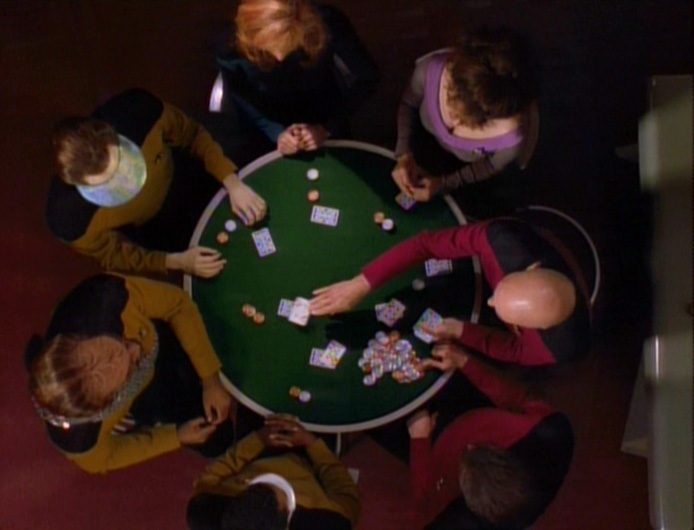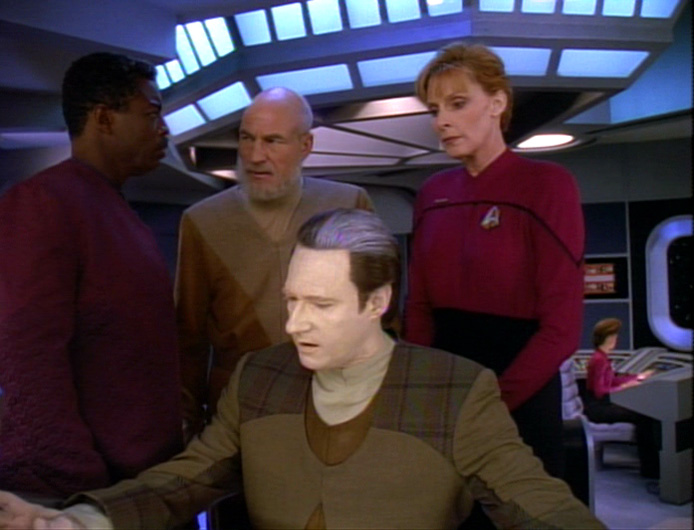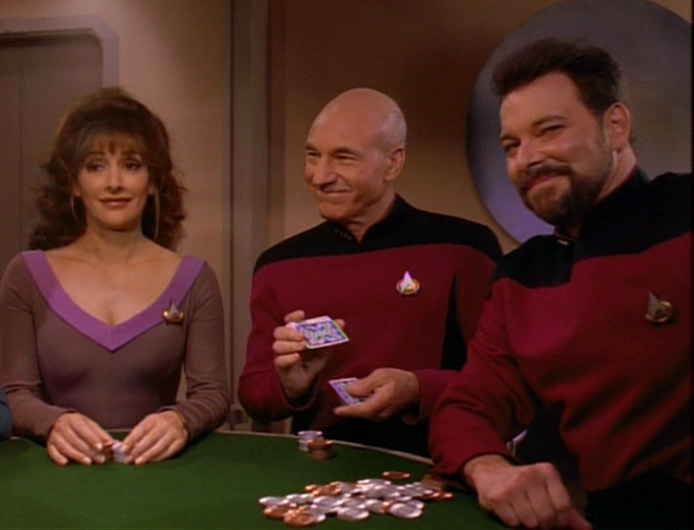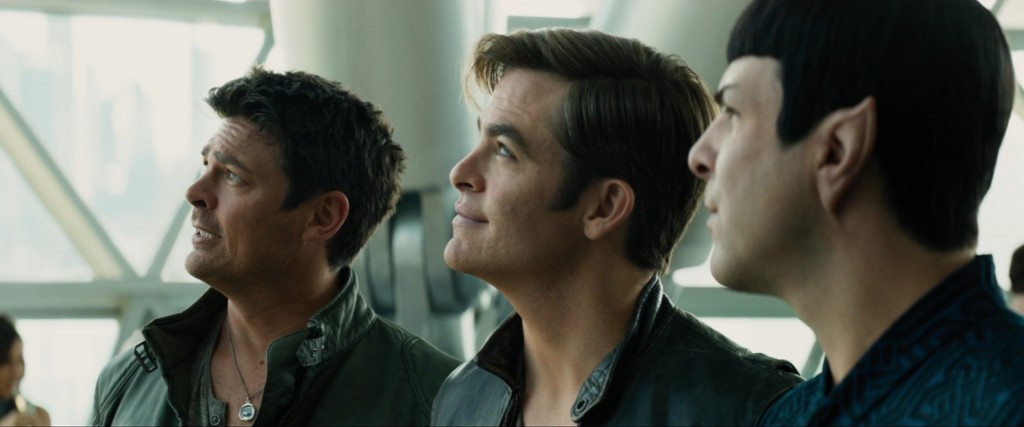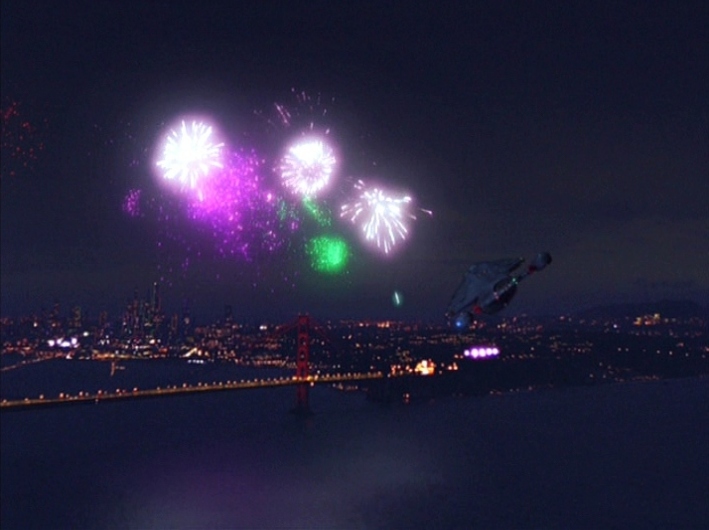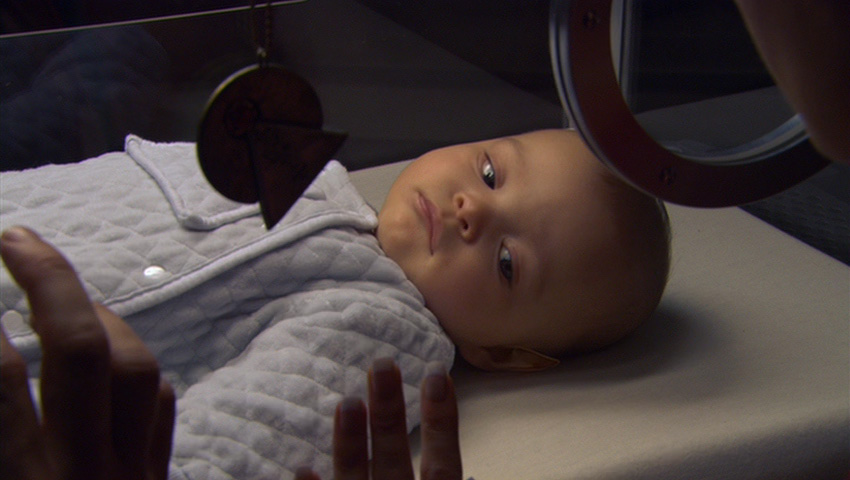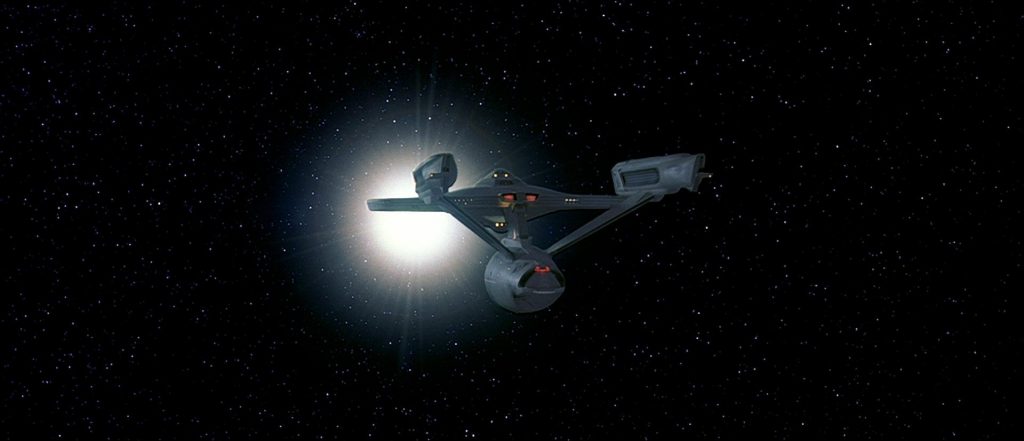Star Trek is an enormous and complex cultural entity whose impact on politics, technology, and storytelling are undeniable. It’s also as flawed and problematic as any other massive media franchise. Since 2014, lifelong Trekkie and Deadshirt Editor-in-Chief Dylan Roth has attempted to make sense of it all for die-hards and outsiders alike in his recurring column: Infinite Diversity.
“Five card stud, nothing wild, and the sky’s the limit.”
– Captain Jean-Luc Picard, the final words of Star Trek: The Next Generation (“All Good Things” [TNG])
After three years and thirty installments (including two individual reviews and the Top 50 Treks countdown), it’s time to bring Infinite Diversity to a close. And just as I began this series by talking about places to begin watching Star Trek, I can think of no more fitting an ending than to talk about finales, of all the times that Star Trek has ended and come back, for better or for worse.
This is a movie-length finale, so let’s keep the teaser short and get right into Act One…
Spoilers ahead for the final episodes of all completed Star Trek TV series, plus The Undiscovered Country and Star Trek Beyond.
The Last Round-Up
The original Star Trek series didn’t really get an ending, since the “Series Finale” as we know it wasn’t a staple yet in American television. The final episode to be aired or produced in the original run of Star Trek was “Turnabout Intruder,” which for my money is one of the worst episodes of any Trek series. Due to being essentially an anthology show, it’s hard to say what a satisfying finale to Star Trek would even have looked like. The characters, their mission, they’re not really headed in any particular direction. The show is literally built around the premise of nearly aimless wandering, of there always being more. Without any character goals, the only end that Star Trek could really have is for Sulu to check his console and say “Captain, we’ve done it! We’ve explored all there is!” Likewise with The Animated Series, which for all intents and purposes is just and extension of the original show.
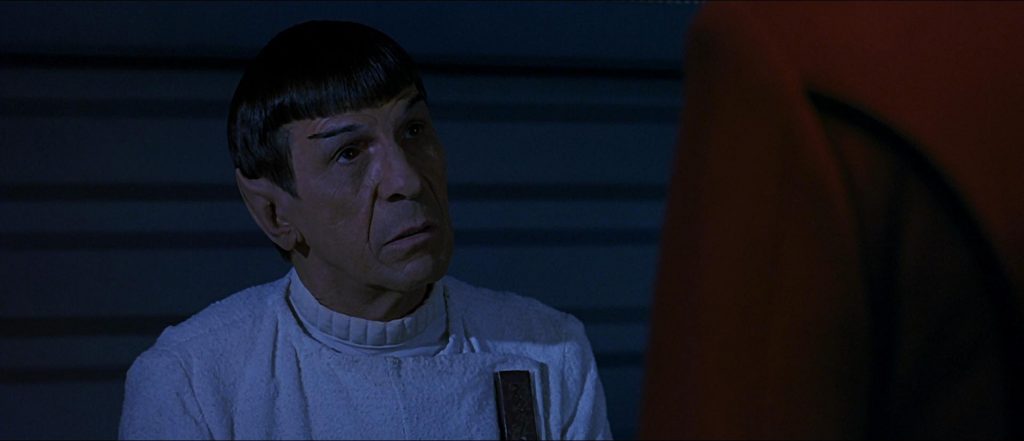
“Is it possible that we two, you and I, have grown so old and so inflexible that we have outlived our usefulness? Would that constitute…a joke?”
Luckily, the original six feature films that followed The Original Series crew did a lot to expand on what motivates James T. Kirk, Spock, and Leonard “Bones” McCoy and allow them to grow as people. They now had better defined flaws and needs, which meant storytellers could provide some sense of closure by satisfying those needs. The film series also developed its own set of themes, particularly aging and mortality, as a result of the advancing years of the cast. It presented a more militaristic Starfleet than the series had, but also was still critical of militarism. Naturally, a finale for this series should comment on all of this and try to leave the audience with some kind of message.
Star Trek VI: The Undiscovered Country finds the Federation and the Klingon Empire at a crossroads. After decades of Cold War, an ecological disaster has forced the Klingons to call for peace. Spock reunites the crew of the Enterprise, most of whom are planning their retirement, to escort Klingon Chancellor Gorbachev Gorkon to the peace talks, but Kirk (a more wounded man since losing his son in Star Trek III) is still locked in the military mindset, mistrusting the Klingons to the point of saying “Let them die.” During the mission, Kirk and McCoy are framed for Gorkon’s assassination and sent to prison. There, Kirk and McCoy plot their escape while Spock and the rest of the crew unravel the truth behind Gorkon’s murder and clear their friends’ names. Kirk is forced to confront and expunge his prejudice against his longtime enemy, and learn to step aside and allow the next generation of people and of ideas to flourish in the peace left by his absence.
From the man himself:
“Captain’s log, stardate 9529.1. This is the final cruise of the starship Enterprise under my command. This ship and her history will shortly become the care of another crew. To them and their posterity will we commit our future. They will continue the voyages we have begun and journey to all the undiscovered countries, boldly going where no man—where no one—has gone before.”
That final correction at the end, amending the classic “Where no man has gone before” from The Original Series to the more inclusive “Where no one has gone before” used on The Next Generation, says so much about the goals of this movie. Our version of this idea has had its day. A new, better version has come and it has already begun to change us. Let it.
It’s a beautiful ending for Kirk and his crew, including so much of what made The Original Series and its films great—the rejection of war in favor of understanding, the value of friendship, the spirit of adventure, and a whole lot of Shakespeare quotes. It’s entirely unambiguous about being The End, as well—the cast literally signs off in the end credits. Of course, Kirk would appear in the following film, Star Trek: Generations, alongside Picard and the TNG cast, for a much less satisfying farewell. Star Trek would go on to throw away a perfectly good ending two more times over the next decade and a half. (Wait, two? Yes, two. Keep reading.)
The Adventure Continues, Together
Arguably Star Trek‘s best finale belongs to The Next Generation and its two-hour episode “All Good Things…”, written by Brannon Braga & Ronald D. Moore, who had been responsible for some of the show’s most memorable stories. While The Next Generation still wasn’t a serialized show, it distinguished itself from The Original Series by having more recurring characters and plot threads, and a few long-running character conflicts. In the short-term, the final season contained a romance subplot between Counselor Deanna Troi and Lt. Worf, complicated by Troi’s previous serious relationship (and continual occasional hookups) with Commander Will Riker. On the long-term, there was the Android Data’s desire to become more human, and more subtly, Captain Jean-Luc Picard’s regrets about his solitary life.
Picard is a fairly formal starship captain, maintaining a degree of professional distance from a lot of his crew. Much of that distance is removed over the course of seven seasons, but it can’t really said that Picard looks at his senior staff as close friends—with the notable exception of Dr. Beverly Crusher, who he has been on-and-off in love with for years. They’ve only recently admitted to having feelings for each other during the final season, but haven’t acted on them. Despite his many professional accomplishments, Picard, in some ways, is still unfulfilled.
In “All Good Things…”, Captain Picard finds himself jumping back and forth through time, from his present day, back to the first episode of the series seven years earlier, and forward twenty-five years in the future, when he is a retired Ambassador living on his family’s vineyard and coping with a diagnosis akin to Alzheimer’s Disease. When the same spacial anomaly appears in all three periods (contradicting the expected events seven years prior), Picard must use his time shifts prevent a paradox that will lead to the end of all life as we know it. It’s a truly epic-feeling finale with the kind of cosmic stakes that The Next Generation rarely dealt with, but it’s also a touching character story.
In the future that Picard visits, the crew of the Enterprise-D has drifted apart. Picard lives in France, apparently alone with his vines. Data and Geordi are both on Earth, teaching at Cambridge and writing novels respectively, but apparently they go years without seeing each other. Riker and Beverly each have commands of their own, while Worf is a Klingon diplomat. Deanna has died years earlier, with neither Will nor Worf by her side, leading to an intense rift between the two men. Picard and Beverly have evidently married and amicably divorced in the ensuing quarter-century (though she still goes by “Captain Picard” on the bridge of ship). The investigation into Picard’s time jumps and the dangerous spacial anomaly brings the crew back together and they begin to repair ties, but they are all killed shortly thereafter.
Seeing this possible future, contrasted by reliving his first encounters with the crew in the past, helps him to see not only how much the people around him have grown, but how important they’ve grown to him. In the past, he meets the late Lt. Tasha Yar again—when he returns to the present, he is struck with feeling. In the future, he has spent years apart from the people who he today takes for granted, and he experiences the power of that loss as well. In the final scene of the series, the bridge crew (Riker, Data, Crusher, Troi, LaForge, Worf) is playing their weekly poker game, frequently an opportunity for them to unwind and unpack their feelings about the events of an episode, when Captain Picard arrives unexpectedly, and for the first time, asks to sit down and join them.
I have never gotten through this scene without crying. What’s going to happen to all of them in the real future no longer matters. What matters is that this time around, they’ll go through it together, like the family they’ve always been. And for this version of Star Trek, that feels like closure enough.
(This ending would later be diluted by the first three Next Generation films and absolutely ruined by the joyless Star Trek Nemesis, but one can simply choose not to watch that. To anyone who hasn’t, I will tell you here that there is almost no reason to ever watch Nemesis, other than an impressive performance by a young Tom Hardy as a clone of Picard.)
While I would certainly welcome another film from the Kelvinverse crew, the ending of Star Trek Beyond has, to me, the same sort of character closure as “All Good Things…”. Beyond sees the crew of the Enterprise at a crossroads, with Kirk and Spock each, independently, considering leaving active duty in Starfleet. At the end of the film, there’s an easy out for any member of the crew to call it a day—after all, their ship, their home, has been destroyed. But ultimately, after their struggle against Krall on Altimid, they choose to stay together. Like previous films, Beyond ends with the classic opening monologue, but for the first time ever, the monologue is split among the entire cast, another touching moment of family. It’s that same kind of open-ended resolution that leaves room for you to imagine a happily ever after full of adventure and friendship.
The Finish Line
While The Original Series and The Next Generation were built around a stable status quo, Deep Space Nine, Voyager, and to an extent, Enterprise, each began with an endpoint in mind. In the pilot episode of DS9, Commander Benjamin Sisko is told flat-out what his mission is: help the planet Bajor rebuild and convince them to join the Federation. Voyager‘s premiere sees the titular starship zapped to the opposite end of the galaxy, with the entire series documenting their long journey back home. Enterprise‘s ultimate goal isn’t super clear at the outset, but over the course of the series (particularly in its final season), it becomes the story of humanity finding its place in the interstellar community and building the relationships that will eventually form the Federation. Ironically, despite those goals all playing an important part in their series finales, all three of them manage to end without actually crossing their stated finish line.
Deep Space Nine‘s final chapter plays out over the course of ten episodes, reaching its climax in the two-hour “What You Leave Behind,” but the ending of DS9 was really being set up for years. In some ways, the team behind DS9 had the easiest task of any of the Trek series when it came to a finale, in that all they had to do was pull the trigger on the half-dozen plot threads they’d been working on all along: Sisko’s destiny with The Prophets vs. Dukat’s with the Pah-wraiths, Odo rejoining the Great Link, resolving the actual Dominion War, and so many smaller character arcs. The major themes of the show are all baked into the finale—prophecy, war, family, and perhaps most of all, redemption. Pretty much the only thing that doesn’t get resolved in the finale of Deep Space Nine is whether or not Bajor will join the Federation, but since the Dominion War was what was holding them back in the first place, it’s not a stretch to imagine that they’ll be joining shortly after the close of the series. (I don’t consider it unresolved as to whether or not Ben will be back for the birth of his daughter. He’ll be there.) Mercifully, no Deep Space Nine movie exists or will ever exist.
Voyager had a slightly different challenge, because while individual stories had advanced the titular starship closer to Earth, they still had a very long way to go in just the final episode. Throughout the series, Captain Kathryn Janeway and the crew of Voyager had been presented with many opportunities to advance themselves all the way home through some exotic means, but usually either their means of transit was less effective than they had hoped, or the crew was forced to refuse the opportunity on some sort of ethical grounds. In fact, Janeway’s steadfast adherence to her principles and refusal to exploit unwilling alien races or break with natural laws around time travel even when they would get the ship home is one of the enduring themes throughout the series—it’s better to remain lost than to lose ourselves. So, naturally, the final episode “Endgame” involves a future version of Janeway traveling back in time from a future in which Voyager took decades to get home so that she can help the crew hijack a Borg transwarp conduit and get home faster, flying in the face of the message of the entire show. And even then, we still don’t quite get to see Voyager come home.
Enterprise, despite getting cut short (canceled after its fourth season, just when it was becoming watchable) manages to get two finales, back to back. The first is the two-part story “Demons”/“Terra Prime,” which serves as a very apt finale for Enterprise as a series. In this two-parter, Enterprise is called home to preside over a conference to establish a loose Coalition of Planets. After spending much of the past season building bridges between the Humans, Vulcans, Andorians, and Tellarites (who will one day found the Federation), this is a very natural place for the show to end, with a precursor to the Federation being created. The conference is threatened by a xenophobic extremist group led by John Frederick Paxton (RoboCop‘s Peter Weller), who threatens mass destruction if all non-humans don’t leave the Terran star system.
This brings the major themes and character arcs of the series to a head and highlights everything that’s changed since the premiere: Captain Archer and Commander Tucker used to resent Vulcans, T’Pol used to dislike Humans, and now they’re the champions of peace and coexistence. This is particularly personal for Tucker and T’Pol, who learn that the terrorists have created a test tube baby with their DNA to demonstrate the threat their union represents—a future where no disparate Human nor Vulcan identity survives. Enterprise as a series is about humanity becoming part of a larger whole, and “Demons”/”Terra Prime” puts that specific future at stake, shows our characters fighting for it with a passion they didn’t have at the outset, and ends not only with the Coalition of Planets being set in motion, but with our Human and Vulcan romantic leads considering a future where they might, indeed, choose to create a new form of life together. It’s still not great television, full of hackneyed dialogue, lackluster effects, and lifeless cinematography, but judged on a curve of Enterprise episodes, it’s a pretty satisfying conclusion.
But once again, they manage to blow it by tacking on an additional ending, this time in the form of the actual Enterprise series finale “These Are The Voyages…”, which is meant to be an epilogue to the series but also a finale to the entire 18-year Rick Berman era of Star Trek, from The Next Generation through Enterprise. It ultimately does no favors for either show (and absolutely nothing for the two in between) and even co-writer Brannon Braga has admitted that it sucks. Given that there was every expectation at the time that it could be the last Star Trek story ever told on screen, it’s really a shame.
Denouement
Four years ago, I began this column with a mission statement:
With Infinite Diversity, I hope to provide a map through the sprawling galaxy of Trek and to discuss its successes, but also to provide critical thought on where, why, and how Trek fails, and where it ought to go in the future. This will be a personal journey of discovery and thought, where everything is considered and nothing is taken for granted. We’re going to go boldly, together, into Star Trek itself.
I’ve never felt like an expert in anything the way I do about Star Trek. I’ve honestly devoted much more time and study to Star Trek than what what my degree is in or what I do for a living. Infinite Diversity was an opportunity to not only put that study to use, but to challenge what that study taught me, and to try and look at it through a new lens. Sometimes that study led to more study. Sometimes I was forced to confront that, even through the prism of Star Trek, there are some subjects that I don’t have the authority to talking about. This led to my opening up the floor to collaborators, which, in the spirit of this column’s title, should really always have been part of the blueprint. Because, cliched as it is to say, the most valuable thing you can learn is how little you know, particularly when you think you’ve already got it all figured out.
Working on Infinite Diversity, digging into Star Trek, having honest conversations about it—to me, this has been bible study. This is a metaphor that may offend some and for that I apologize, but for me it’s true. I’ve built a great deal of my life around this dumb TV show, the values it espouses, and the role models it presents. Deconstructing it has helped me to understand who I am and where I come from, and also to confront the occasions when this thing that helped to create me is wrong. The act of study has changed the work for me, and changed me as well. Sharing this experience with readers, friends, and co-writers, having the opportunity to converse with other passionate people, has been so enriching.
The advent of Star Trek: Discovery has opened up a whole new world of critical thought about Star Trek. Star Trek is a living document again, and that’s beautiful. As for me, I prefer to talk about works when they’re finished, because how things end often paint the entire experience differently. (“How we deal with death,” after all, “is at least as important as how we deal with life, wouldn’t you say?”) My longform Trek writing tenure is over, but my hailing frequencies are always open. Thank you for accompanying me on this adventure.
And with that, I bid you peace, and long life.

